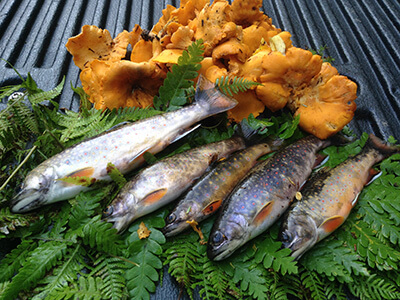Grateful for the earth’s gifts – no matter what form they take
I recently headed up into the mountains in search of native brook trout with a few very accomplished angler friends—Mark Wilde and John Lesher. My back had been acting up quite a bit, and I had to be extra careful of the terrain that we were going to fish. The entry to the small mountain stream was down a steep embankment of rocks and roots covered with a slippery emerald moss. I chose my steps carefully and clung to every tree that would support my frame.

Now this might have been accomplished more simply had I not had an expensive LL Bean flyrod and reel with me, but that is a part of the whole picture. Once into the stream it was necessary to monitor each step. Some of the rocks and pebbles were a little slippery with some dark green algae and uneven footing. One second, I’d find myself with one foot on a firm dry rock, and if I was not paying close attention, the next step would send me reeling toward the surface of the rippling water.
Before we walked into the stream, I had mentioned to my friends that I had not caught a fish in these waters for three years, but with two anglers with far greater skills than my own, I would soon find out if it was just my less than exceptional casting and presentation or if, in fact, something about this river had changed. If anyone could catch brookies in this stream it would have to be these two talented fishermen.
They still wanted to try. “Okay,” I said. “This will prove to me that it is not my lack of skill that leads to my frustration.” Upon examining the water and taking its temperature with two separate thermometers, we decided that 66 degrees was certainly habitable for the magnificent Salvelinus Fontanalis, known by true Vermonters as the State Fish—the brook trout.
Brookies have inhabited Vermont waters since the retreat of the glaciers. They can live only in cold, clean water, which is why if you want to pursue them you will need to climb down steep embankments and clamber over boulders from the last big spring melt. As destructive as nature can be, it also presents new opportunities, such as deep pools where the torrential spring waters carve into the streambed.
These pools provide welcome habitat for the brookies on sweltering hot days like the one we experienced. Ambient air temperatures were hovering around 90 degrees after several cooler days earlier in the week. We fished every pool for about a half-mile upstream, leapfrogging one another and, being gentlemen, offering the next good-looking opportunity to the next guy.
After two hours with no fish and not even a rise to inspire us, we began hypothesizing reasons for what we called the “PBNF” syndrome, which we decided stood for “Pretty Brook No Fish.” Our best guess was that, after three summers of extremely high temperatures (brookies struggle to survive water temps over 70 degrees), the entire wild brook-trout population of this stream had been wiped out. I told the guys that four to six years ago I would have caught 20 to 30 of these gorgeous fish and never kept more than two or three for the frying pan.
So, what was the cause of this precipitous decline? Overfishing? The current Vermont Fish and Wildlife laws allow an individual to take 12 brook trout in a day. This is an excessive limit and should be reduced by at least half. But is this what caused the decline? I doubt it, because the paths down to these pools were not well worn at all. They are extremely hard to access, and no lazy fisherman would risk their life to do so.
I sat sullenly on a big rock that had the perfect shape for an old man’s behind and found myself getting really depressed about the possibility that this fishery was no longer viable. It felt like a vise was constricting my heart—not the kind of physical pain that one fears, but one of deep sadness for a once-productive ecosystem decimated by our changing world. At my lowest point, I began to pray. I had surrendered to the realization that this stream would not produce anything again this year.
I stood up and wandered into the pine woods and found a small trail along the bank. As I focused on the love I have for this planet, my eye caught a glimpse of bright yellow to my left. Chanterelles! Gorgeous, funnel-shaped and fluted wild mushrooms! I began to pick these beautiful edible mushrooms and, without diminishing their population, was able to fill my fishing creel with the succulent morsels.
On the hike back to the truck, I realized that sometimes the Great Spirit presents us with gifts for which we weren’t really looking. Maybe the next time I want to go brook trout fishing, I’ll just set my focus on everything this world offers and be grateful for her gifts—no matter what form they take.
Bradley Carleton is executive director of Sacred Hunter, a nonprofit that seeks to educate the public on the spiritual connection of man to nature.

